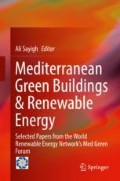Abstract
Global warming affects the built environment by changing the environmental conditions under which buildings operate. This change probably means a shift in thermal demand, from a predominant demand for heating to a higher demand for cooling in many climates. For instance, in cold climates global warming seems to be a self-decreasing phenomenon because of lower energy demand in warmer environments. In warmer climates, like the Mediterranean, and in the hottest climates (both humid and arid), global warming must be regarded as one of the main factors (the others are the change in comfort standards and the heat-island effect) in increasing the energy demand to cool buildings. This chapter analyses the environment of various cities, characterised by mild average temperatures and small thermal oscillations, that can be regarded as Mediterranean climate emplacements. Today these cities have more heating than cooling demand but in the future will probably have higher cooling requirements. Results show that by 2050, in most of the considered emplacements, cooling demand will be higher than heating demand and emissions will rise proportionally. Solutions to this problem must be sought in the flexible operation of buildings, and policies should focus on summer-related issues: good natural ventilation, protection from the sun, and internal gain reduction, rather than insulation, air infiltration reduction and solar access.
References
Jentsch MF, Bahaj AS, James PAB (2008) Climate change future proofing of buildings—generation and assessment of building simulation weather files. Energy Build 40(12):2148–2168
IPCC Special Report (2000) Emissions scenario. IPCC official site http://www.ipcc.ch
Climatic change weather file generator manual (2009) UKCIP official site http://www.ukcip.org.uk or Southampton School of Civil Engineering and the Environment official site http://www.serg.soton.ac.uk
Chilean Government (2015) Energy Ministry. http://huelladecarbono.minenergia.cl/sistemas-electricos
Spanish Government (2014) Ministry of industry, energy and tourism. http://www.minetur.gob.es/energia/desarrollo/EficienciaEnergetica/RITE/propuestas/Documents/2014_03_03_Factores_de_emision_CO2_y_Factores_de_paso_Efinal_Eprimaria_V.pdf
Italian Government (2013) National information system for environmental protection. http://www.sinanet.isprambiente.it/it/sia-ispra/serie-storiche-emissioni/fattori-di-emissione-per-la-produzione-ed-il-consumo-di-energia-elettrica-in-italia/view
Acknowledgement
This study is part of the FONDECYT project (11140578) and was sponsored by the Catholic University of the North and by the University of Rome “La Sapienza” Visiting Research Programme.
Author information
Authors and Affiliations
Corresponding author
Editor information
Editors and Affiliations
Rights and permissions
Copyright information
© 2017 Springer International Publishing Switzerland
About this paper
Cite this paper
Palme, M. (2017). The Possible Shift Between Heating and Cooling Demand of Buildings Under Climate Change Conditions: Are Some Mitigation Policies Wrongly Understood?. In: Sayigh, A. (eds) Mediterranean Green Buildings & Renewable Energy. Springer, Cham. https://doi.org/10.1007/978-3-319-30746-6_30
Download citation
DOI: https://doi.org/10.1007/978-3-319-30746-6_30
Published:
Publisher Name: Springer, Cham
Print ISBN: 978-3-319-30745-9
Online ISBN: 978-3-319-30746-6
eBook Packages: EnergyEnergy (R0)

